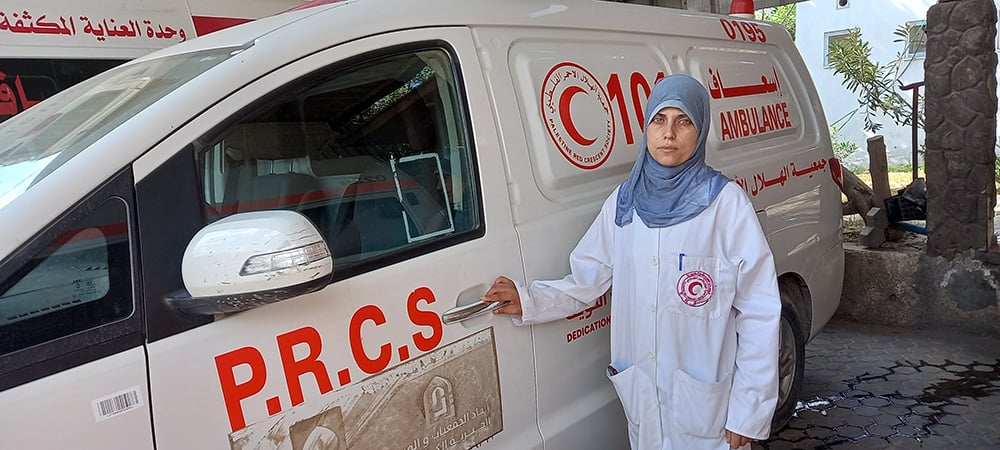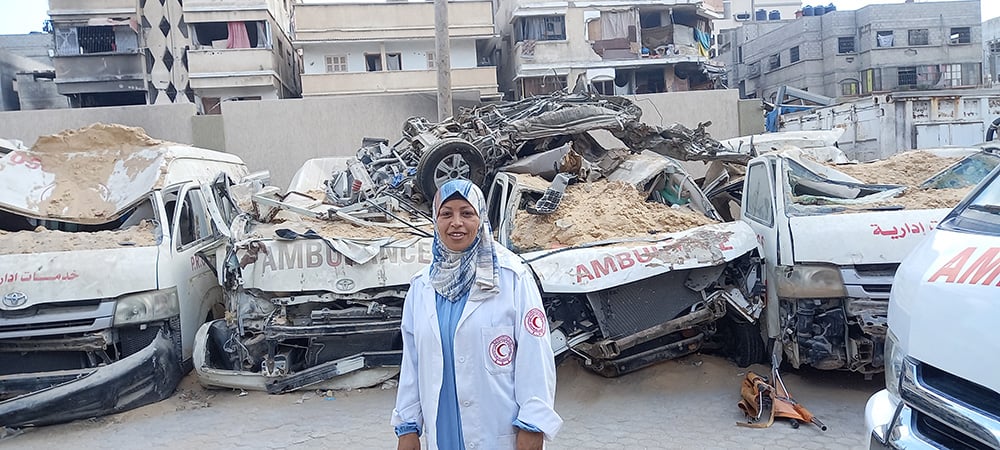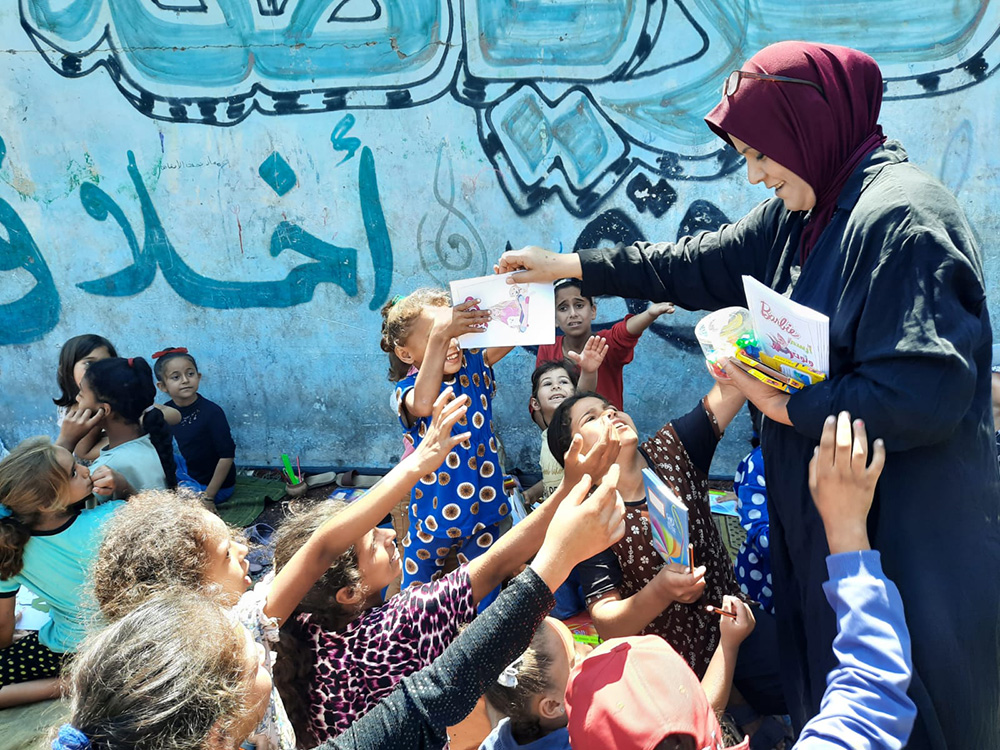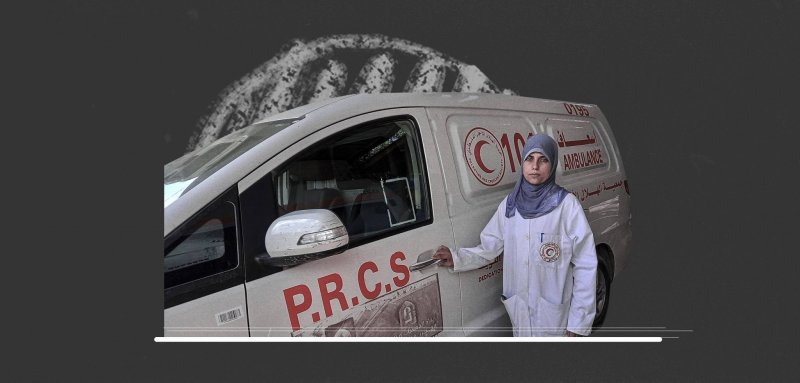December 2, 2023, was no ordinary day for emergency response officer Maha Wafi.
The 42-year-old paramedic received a phone call from one of her colleagues, informing her of the arrest of her husband, Anis al-Astal, a paramedic and emergency response officer with the Palestinian Ministry of Health, at the Netzarim Corridor, which separates northern and southern Gaza.
Her husband was arrested while attempting to evacuate injured patients from Kamal Adwan Hospital to the southern part of the Gaza Strip, in preparation for their travel abroad to continue their treatment.
Maha, a paramedic in Gaza, says that what she witnesses in the field is beyond what any human heart can bear. "How can I laugh when the smell of blood and the sight of bodies and torn limbs never leave me?" she says.
With deep sorrow, Maha described that day to Raseef22: "It was the hardest day of my life. I lost my sole support in life. One tragedy followed another in this brutal war, and I found myself standing alone. I had no one to help me through the hardships of life."
Maha, along with her husband and five children, was forcibly displaced more than 12 times after the Israeli army completely destroyed their home in Khan Yunis.
Despite the bravery and courage Maha showed since she began working as a paramedic with the Palestinian Red Crescent Society 24 years ago, the arrest of her husband, combined with her duties as both a mother and a field worker amid a genocide, has become a burden too heavy to bear.
Despite the bravery and courage Maha showed since she began working as a paramedic with the Palestinian Red Crescent Society 24 years ago, the arrest of her husband, combined with her duties as both a mother and a field worker amid a genocide, has become a burden too heavy to bear.
The United Nations Entity for Gender Equality and the Empowerment of Women (UN Women) stated that “the survivors of Israeli bombardment and ground operations may find themselves displaced, widowed, and facing starvation. This makes the war on Gaza a war on women as well.”
While more than 11,000 women have been killed in Gaza, the survivors live in indescribably harsh conditions—conditions that become even more difficult for those who are the primary breadwinners and work in dangerous professions like relief and humanitarian work.
 Gazan mother and paramedic Iman Wafi
Gazan mother and paramedic Iman Wafi
Gazan mother and paramedic Iman Wafi
Journeying to death
Every time the emergency and ambulance center of the Palestinian Red Crescent in Khan Yunis receives a call, Maha dons her coat and heads out with the ambulance driver, navigating the rough roads of the city. She carefully tracks the location of the strike, fearing that she and her colleague might be exposed to sudden danger, since "the Israeli soldiers have no respect for the ambulance emblem in their playbook," she says.
Maha, a paramedic in Gaza, considers her own suffering, though severe, to be modest compared to the greater sacrifices endured by the victims of war, especially children and women. She witnessed the feeling of graphic loss and pain when she saw a child, barely two years old, who had lost his family and had his leg and arm amputated in one of the Israeli strikes during this brutal war.
Maha cannot forget the danger she faces on a daily basis during the current war, including an incident where an Israeli missile landed near the ambulance she was in during one of her missions, and she narrowly escaped death.
"I have no concern for the complexities or burdens of politics—who started the war, who fuels it, who negotiates, or who maneuvers. What matters to me is stopping this bloodshed and the loss of innocent lives," she stresses.
Maha considers her own suffering, though severe, to be modest compared to the greater sacrifices endured by the victims of war, especially children and women.
She witnessed the feeling of graphic loss and pain when she saw a child, barely two years old, who had lost his family and had his leg and arm amputated in one of the Israeli strikes during this brutal war.
She also recounts the story of a young woman who lost her husband and children, and then decided to care for an elderly disabled woman she didn't even know. An Israeli missile had wiped out her entire family, so the young woman chose to stay by the elderly woman’s side and look after her.
Maha, a paramedic in Gaza, recounts the story of a young woman who lost her husband and children, and then decided to care for an elderly disabled woman she didn't even know. An Israeli missile had wiped out her entire family, so the young woman chose to stay by the elderly woman’s side and look after her.
In the border town of Khuza’a, east of Khan Yunis in the southern Gaza Strip, 45-year-old emergency response officer Safaa Baraka works day and night to help the injured.
Safaa often has to walk a long distance to catch the bus to the ambulance center, which she calls her "second home."
"The most painful thing for me during this war were the scenes of injured people being crammed into a single ambulance because we are unable to distribute cases across several vehicles. Many ambulances have been damaged or taken out of service due to Israeli targeting and shelling," Safaa tells Raseef22.
She adds that she once had to transport the dead body of her closest friend, who had been martyred along with her family. That particular day haunts her; she now fears facing the same scene with her family members and loved ones.
What motherhood is like in Gaza
Maha’s children often ask about the smile that was always present on her face, but is now long gone. She tells them that what she witnesses in the field is beyond what any human heart can bear. "How can I laugh when the smell of blood and the sight of bodies and torn limbs never leave me?" she says.
"The most painful thing for me during this war were the scenes of injured people being crammed into a single ambulance because we are unable to distribute cases across several vehicles. Many ambulances have been damaged or taken out of service due to Israeli targeting and shelling.”
Regarding the responsibilities her husband left behind in his absence, she adds, "I endure the daily struggle of securing clean drinking water, water for household use, buying firewood, and finding gas—if available. Even getting cleaning supplies has become an immense struggle."
Safaa shares a similar experience, stating that the war has significantly reduced the time she dedicates to raising her children. "I used to spend much more time teaching my kids and helping them with their schoolwork. But now, there are no schools or education in Gaza. I fear this academic year will be lost just like the previous one," she says, lamenting the loss of her daughter's final exams. Her daughter had hoped to continue her education and become a doctor.
In addition to long working hours, Safaa found that the demands of war have added new responsibilities, like hand-washing clothes, cooking with firewood, and baking bread, making it even harder for her to keep up with her children’s English and math lessons.
She does her best to enroll her kids in community education and learning initiatives, hoping to make up for the lost academic year.
 Gazan mother and paramedic Safaa Baraka
Gazan mother and paramedic Safaa Baraka
Gazan mother and paramedic Safaa Baraka
Community activists on the frontlines
Meanwhile, Juliet Abu Shanab, 54, a social activist and aid worker from Deir al-Balah in central Gaza, has a different war story to tell. She was displaced, burdened with finding a safe place for her family, in addition to her work and other life responsibilities.
Safaa, a paramedic in Gaza, once had to transport the dead body of her closest friend, who had been martyred along with her family. That particular day haunts her; she now fears facing the same scene with her family members and loved ones.
"The repeated displacement has only worsened our suffering as relief workers. We work around the clock, barely able to meet people's endless needs in such a harsh reality," Juliet tells Raseef22.
As a volunteer, Juliet moves from person to person, listening to their stories and trying to meet some of their needs. However, she points out that the overcrowding of displaced people in her city has made it difficult to reach all the groups most affected by the war. She urges various relief agencies to coordinate their efforts to ensure that aid and relief reach those who need it most.
Juliet has found herself becoming a friend to displaced women from all over Gaza, sharing in their worries and pain. "My face has become familiar to most of the women in shelters and displacement camps. It's an honor and a privilege to stand with them during these darkest times," she says.
Islam Badwan, a coordinator at the Sharek Youth Forum (SYF), believes that working amidst this genocide is akin to facing certain death.
She recalls that the most dangerous experiences she faces during her work are sudden shelling and bombardment that target everyone. She recounts to Raseef22: "Our team sustained injuries from nearby shelling while conducting an activity at a school in Rafah, and we survived by a miracle."
According to Islam, the dangers faced by humanitarian workers are not limited to their work environment; shelling can follow them into their shelters or temporary tents.
During her work, Islam has encountered exceptional challenges, including power outages, weak internet connectivity, and long periods of communication disruption, which greatly impacted the execution of her activities and events.
In addition to long working hours as a paramedic, Safaa found that the demands of war have added new responsibilities, like hand-washing clothes, cooking with firewood, and baking bread, making it even harder for her to keep up with her children’s English and math lessons.
She shares that sometimes, her team faces verbal or physical violence from children, a reaction to the psychological and social pressure they experience in the shelters.
Yet, despite the challenges surrounding her work, she sees it as a window of hope that could rescue Gazans from their crumbling reality.
 Relief worker Juliet Abu Shanab
Relief worker Juliet Abu Shanab
Relief worker Juliet Abu Shanab
Direct targeting: In the line of fire
Humanitarian organizations in the Gaza Strip face direct targeting of their staff and facilities. This targeting can manifest in besiegement, blockades, and gunfire directed at these organizations, as happened with the Red Crescent Society in Khan Yunis, to name just one example.
Those working in humanitarian and relief fields in Gaza are also at risk of arrest or enforced disappearance.
Human Rights Watch reported on August 26, 2024, that "the Israeli army arbitrarily detained Palestinians working in healthcare in Gaza—in the period after October 7—and transferred them to detention facilities in Israel, where they were tortured and mistreated."
The violations described by doctors, nurses, and paramedics who were released include humiliation, beatings, forced stress positions, prolonged restraints and blindfolding, denial of medical care, and torture, including rape and sexual assault by Israeli forces, alongside denial of medical care and poor detention conditions for all detainees.
Despite the United Nations Security Council adopting a resolution in May calling for the protection of humanitarian workers in conflict areas, concerns remain about Israel's commitment to implementing its terms.
* The views and opinions expressed in this article are those of the author’s and do not necessarily reflect the official policy or position of Raseef22
Raseef22 is a not for profit entity. Our focus is on quality journalism. Every contribution to the NasRaseef membership goes directly towards journalism production. We stand independent, not accepting corporate sponsorships, sponsored content or political funding.
Support our mission to keep Raseef22 available to all readers by clicking here!
Interested in writing with us? Check our pitch process here!



